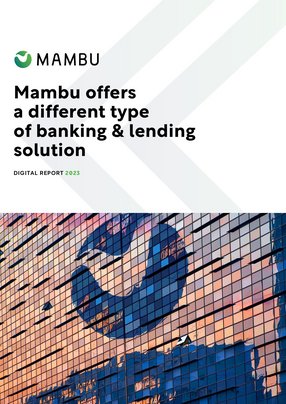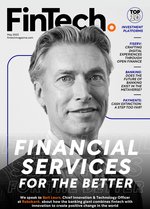Mambu offers a different type of banking & lending solution
With markets, behaviours and customer demands changing quickly, financial institutions need to act with speed. And with McKinsey predicting the pace of change in the banking industry will speed up significantly over the next few years, banks and lenders need a solution that helps them stay ahead of the curve.
Mambu is a SaaS, cloud-native, API-driven banking and financial services platform, designed to power financial innovation, bring solutions to market faster, drive down cost barriers and allow ecosystems to expand.
“I'm a firm believer that the core banking world is very niche,” explains Nick Lawler, Mambu’s Market Sales Director for UK&I. “What we do, we cannot do as any one individual. And that's the same for any one business.
“No one person can deliver a transformational change to a bank or a building society or a financial institution. You need to look at the wider ecosystem. That's my role, pulling it all together, and that's essentially what Mambu does as well.”
Founded in 2011, today Mambu’s customer list includes fintech start-ups, telcos and top-tier banks, operating on six continents and helping customers constantly change the way financial institutions operate and innovate.
A different type of banking solution
As Lawler explains, offering a completely open architecture, Mambu is a different type of banking solution. “Some people back in the day, or even now, will choose to self-build a system in-house. But if you build a system in-house, you are reliant on those people that built it, retaining their skillsets and knowledge.
“For some people, a modular approach works. But there are other people out there who want to embrace this modern technology. And that's where we come in with composable banking.”
A term coined by Mambu, composable banking provides components that can be selected and assembled in various combinations to satisfy specific user requirements.
“We do across-the-board current accounts,” Lawler explains. “And we support lenders through one single code base. It's one platform globally, it's SaaS. We regularly push new releases to make sure our clients are on the latest version. That's part of what we do.”
With the current turbulent economic times, financial institutions are having to act quickly, launching and scaling products at speed. As Lawler describes, Mambu provides financial institutions with the flexibility to build a product quickly, launch it to market, and test it, all in a true SaaS model.
“What we've seen is there's a big change in the market that works for both mortgages and savings,” he says. “The interest rate changes we've seen have meant mortgage rates have increased. So that means mortgage lenders are pulling their products, they've got to launch new products quickly and put them to market.
“But on the flip side of that coin, rates are going up on deposits. They've been at historic lows which now means people need to react quickly to the market. You've got to be competitive, otherwise, your deposits are losing, and customers may leave your business and go to the next bank that is quicker to market with a better product.”
Changes like this in a legacy stack take time. “There might be lots of testing, you might have to go back to your vendor, and it can take weeks.
“In the market, weeks is a long time,” Lawler explains. “Suddenly either you haven't had the mortgage product you want on the market and you've been selling at a lower rate, or your savings rate is paying too little, which means people are going to your competitors."
With the global lending market expected to reach US$8.9tn in 2025, and US$11.6tn in 2030, flexibility is key for businesses looking to enter or expand in the personal and business lending spaces.
“What Mambu is doing is allowing financial institutions to have the flexibility to build a product quickly, launch it to market, and test it in this SaaS model,” Lawler comments. “Mambu is a configurable solution. If you had a bank that is wanting to have freedom in their choices of how they serve their customers to work with their own originations partner or build in-house or do their own use flows on digital banking, Mambu supports that.
“Whether it be a mortgage application or a deposit application, we can support that, power it, we can take the relevant customer fields in,” he says. “We allow our customers to basically be their own institution, support their own needs, but powered by a global solution.”
Giving power to customers
As Lawler explains, ultimately the goal for Mambu is to give power to its customers. “A customer will have the same solution in Brazil that they will in the UK or in Australia. But each of those customers will be using that solution in a slightly different way and then putting orchestration and configuration around it for the way they want to work.
“What we give them is that freedom. From a mortgage perspective, they might be tied into legacy stacks with big change requests, and delays in product changes. We remove that for them, we allow them to update products quickly, and plug-and-play with the partners they choose.”
With its cloud-native platform, Mambu allows financial institutions to constantly improve and be nimble and ready for change as it happens.
“From a deposit angle, rates move quickly,” Lawler explains. “And it works both ways. You might find yourself at the top of the best buy table. Perhaps you don't want to be number one, in which case you can pull the product, and put a new one on market. Or perhaps you want to be number one because you want to do something on your lending line or to launch an aggressive product. We're there to support it all the way through.”
Dealing with turbulent economic times
Recent news about crises in the financial sector, from the collapse of Silicon Valley Bank to the bailout of Credit Suisse, has highlighted the turbulent economic environment in which we inhabit. As Lawler explains, the UK and Ireland are at the forefront of banking and technology. “We are a heavily-regulated, stable environment,” he comments. “We saw what happened with Silicon Valley Bank, they had a situation that would not have been allowed in the UK. ”
From a Mambu perspective, numerous financial institutions have chosen its platform to help them bring solutions to market faster, drive down cost barriers and allow ecosystems to expand.
“We have seen a wave of new entrants, and we have powered the bulk of those,” Lawler says. Since the wave of new players in the market, the number of new banks has slowed in the UK as the market changes. “But from a Mambu perspective, we signed 48 new logos, and any core vendor globally would be chomping at the bit to get that traction,” Lawler adds.
As the launch of the new banks has slowed, Mambu is looking at innovating with new solutions in the brownfield space.
“We are now stepping up and working, not just with greenfield projects, new entrants,” Lawler explains. “We are also moving into the brownfield, true transformational migration plays in the UK, which tend to be riskier.
“People are seeing the strength in the Mambu solution. We are helping to move large financial institutions away from legacy technology stacks, and people are seeing the benefits and they have belief in it.
“We haven't just rebadged something. We are a true modern stack,” he says. “We are going to continue growing within the region. We're going to continue maturing the solution, and the people around us, growing as a business, which is an exciting step for Mambu.”
With financial institutions looking to modernise, a lot of it comes down to cultural change within the business. “You will have people who've worked in a bank for 10 or 20 years who will have never been through this process,” Lawler explains. “They've only worked on one system and that system is all they know. People will be nervous from the board level to the grassroots.
“That's where we come in. We support that. And we'll continue to do that over the next year and beyond.
“We are not just a vendor, we are a partner. From Customer Success and Customer Value to Partnerships, we continue to stay with our customers and work with them and make sure we're doing the best for them.”
- Mambu: 85% of Gen Z Muslims Want to Try Islamic BankingFinancial Services (FinServ)
- Cloud Switch is Multi-Trillion Opportunity for Banks – MambuBanking
- Mambu celebrates latest digital banking triumph in AustraliaBanking
- Mambu: Cementing growth as a SaaS providerFinancial Services (FinServ)


